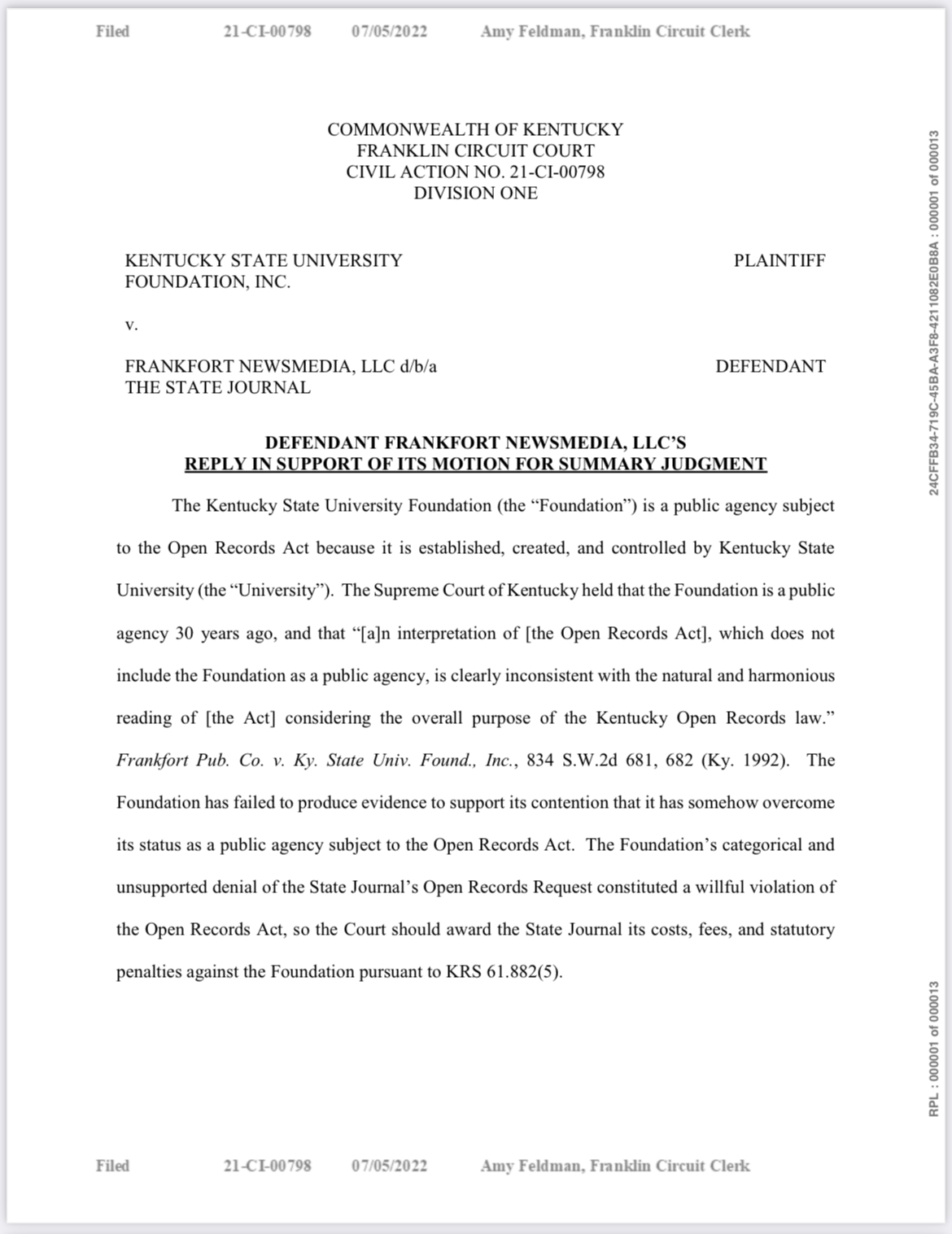
On Tuesday, the State Journal filed a reply to the Kentucky State University Foundation’s June 22 response opposing the newspaper’s motion for summary judgment.
https://www.facebook.com/1846598708/posts/10217115438398542/?d=n
https://www.facebook.com/419650175248377/posts/1158107984735922/?d=n
https://kyopengov.org/blog/settled-issue-law-kentucky-not-satisfaction-…
In its motion, and again in its reply to the foundation’s response, the State Journal asks the Franklin Circuit Court to affirm the foundation’s status as a public agency for open records purposes “because it is established, created, and controlled by Kentucky State University” per KRS 61.870(1)(j).
https://apps.legislature.ky.gov/law/statutes/statute.aspx?id=51390
The newspaper’s position is grounded in 1992 Kentucky Supreme Court precedent recognizing that “[a]n interpretation of [the Open Records Act], which does not include the [Kentucky State University] Foundation as a public agency, is clearly inconsistent with the natural and harmonious reading of [the Act] considering the overall purpose of the Kentucky Open Records law.” Frankfort Pub. Co. v. Ky. State Univ. Found., Inc., 834 S.W.2d 681, 682 (Ky. 1992).
https://casetext.com/case/frankfort-pub-v-kentucky-st-un-found
On behalf of the State Journal, attorneys Jeremy Rogers and Susan Marino urge the Court to reject the various arguments advanced by the foundation that it is not “controlled” by KSU.
They focus on the foundation’s failure “to produce evidence to support its contention that it has somehow overcome its status as a public agency subject to the Open Records Act” and present additional evidence of direct and continuing university control.
“The uncontroverted evidence in the record establishes that the Foundation’s purpose is to support the mission and priorities of the University and that the Foundation must build funds to financially support those priorities. Since the Foundation exists solely to support the University’s priorities as defined by the University, it is illogical to conclude that the University is without any control over the Foundation’s management and policies. By definition, the management and policies of the Foundation must serve the University’s priorities; in this sense, the University may set priorities as a means of commanding the Foundation’s support thereof.
“Moreover, under the Memorandum of Understanding, when the Foundation transfers funds to the University, the Foundation must carry out such a transfer ‘in compliance with . . . University policies[.]’ Accordingly, the University directly controls the Foundation’s management and policies by requiring the Foundation to comply with the University’s policies. Even if ‘control’ under the Open Records Act were limited to direction over management and policies, the University controls the Foundation because the Foundation must employ management and policies that serve the University’s priorities and adhere to the University’s policies.”
Notwithstanding it’s “conscious effort” to disaffiliate from the university after the 1992 Supreme Court opinion — to ensure that its records would no longer be inaccessible under the open records law — “it is still true that the Foundation is controlled by the University and is thus a public agency under the Open Records Act pursuant to KRS 61.870(1)(j).
“Since the Supreme Court determined that the Foundation is a public agency subject to the Open Records Act, the Foundation has tried to circumvent that determination. Despite the Supreme Court’s clear holding, the Foundation has flatly ignored requesters’ rights under the Open Records Act. It has done so in the face of a Kentucky Supreme Court determination that it is a public agency subject to the Act based on both the Foundation’s purpose (to benefit the University) as well as the overall purpose of the Open Records Act.”
“The Foundation is a public agency subject to the Open Records Act because it is established, created, and controlled by the University. The University and the Foundation act as one and the same, and the Court should decline to borrow irrelevant and inapplicable definitions of ‘control’ for its present analysis under the Open Records Act.”
Kentucky’s courts again have the opportunity to implement the legislative policy supporting “free and open examination of public records” even when efforts are made to “secret them away” in an •ostensibly• private foundation. We fully expect the courts to pierce the veil of secrecy as it has consistently done in the past.
Univ. of Louisville Found., Inc. v. Cape Publs., Inc., No. 2002-CA-001590-MR, 2003 Ky. App.
Unpub. LEXIS 1370, *22 (Ky. App. 2003).
Cape Pub'ns, Inc. v. Univ. of Louisville Found., Inc., 260 S.W.3d 818, 822-23 (Ky. 2008).
Protracted litigation in this context is inimical to the taxpayers’ interests, the taxpayers’ pocketbooks, and Kentucky State University’s professed desire to begin a new transparent and accountable chapter.



